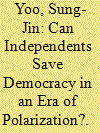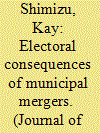| Srl | Item |
| 1 |
ID:
187449


|
|
|
|
|
| Summary/Abstract |
It is evident from the literature that political polarization has played a role in facilitating voter participation. While high participation in a representative democracy is beneficial, it becomes dangerous when this results from intense polarization. This is because polarization has a greater potential to undermine the principles of democratic pluralism. With data from the 21st Korean general assembly, I find that independent voters consider political issues to be important cues for participation even under extreme polarization. Short-term issues such as the government response to COVID-19 that have largely been the concern of independent voters, have had a significant effect on voter participation, and the evaluation of party nominations has also had an impact on turnout among independents. These findings show that Korean democracy has not been completely buried under the influence of polarization and that the political process of representative democracy in Korea is still operating normally thanks to the existence of independent voters.
|
|
|
|
|
|
|
|
|
|
|
|
|
|
|
|
| 2 |
ID:
117076


|
|
|
|
|
| Publication |
2012.
|
| Summary/Abstract |
The dominance of Japan's Liberal Democratic Party (LDP) was long buttressed by the existence of a strong political support base in the rural areas led by local politicians who worked on behalf of national LDP politicians seeking reelection. In recent years, municipal mergers have drastically weakened the LDP's support base by reducing the number of local politicians and redrawing electoral district boundaries. Surprisingly, the main opposition party, the Democratic Party of Japan (DPJ), could not take full advantage of these new institutional arrangements. Instead, local politicians have become more independent of both major parties. As a result, at a time of increasing numbers of floating voters, neither of Japan's two major parties has a reliable local base across the country. To succeed, both parties must pay attention to the changing needs of the increasingly independent-and very often still rural-localities.
|
|
|
|
|
|
|
|
|
|
|
|
|
|
|
|